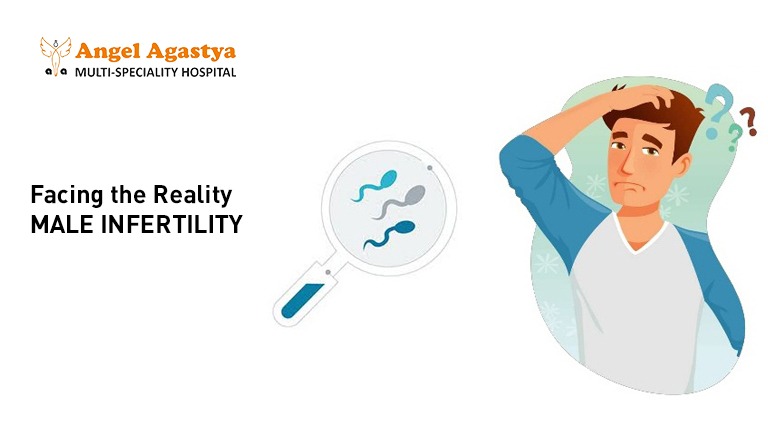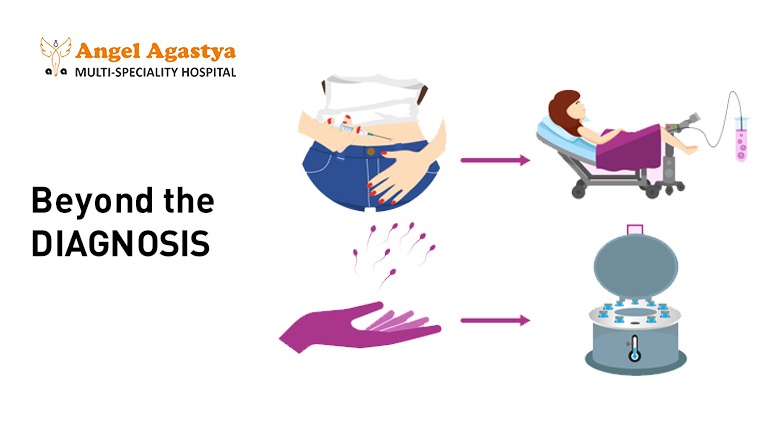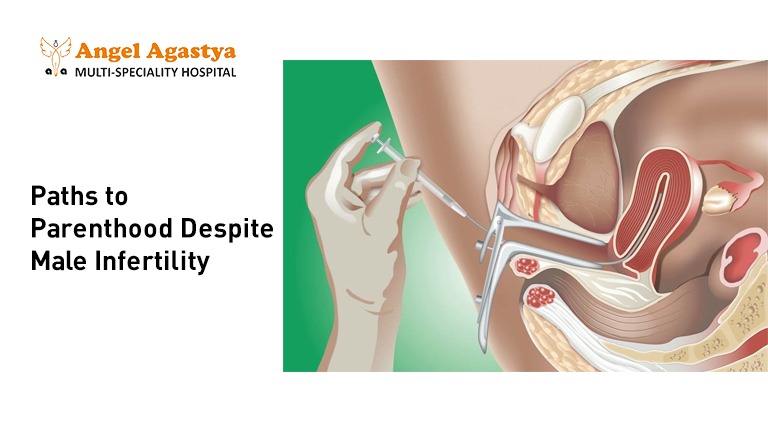Facing the Reality:

A diagnosis of male infertility can feel like a sudden detour on the road to parenthood. Disappointment, confusion, and a million questions might cloud your mind. You’re not alone. Many couples face this challenge. This blog aims to be your guide, offering clarity and hope. We’ll delve into the reasons behind male infertility, explore various paths to parenthood despite the diagnosis, and equip you with resources for making informed decisions. From advanced reproductive technologies (ART) to alternative family-building options, we’ll explore all the possibilities. Remember, knowledge is power. With the right information and support, you can create a fulfilling family journey.
Understanding Male Infertility:
This section sets the foundation by explaining male infertility:

- The Silent Struggle: Male infertility can be a hidden struggle, often causing feelings of guilt or inadequacy. Understanding the causes can provide clarity and empower you to explore solutions.
- Causes of Male Infertility: This section explores various factors affecting male fertility, including:
- Low sperm count: This refers to a lower-than-average number of sperm in the semen.
- Sperm motility problems: Sperm need to be able to move actively to reach the egg.
- Abnormal sperm morphology: The shape of the sperm can affect its ability to fertilize the egg.
- Varicocele: This is an enlarged vein in the scrotum that can affect sperm production.
- Hormonal imbalances: Hormones like testosterone play a crucial role in sperm production.
- Undescended testicles: In some cases, one or both testicles may not descend fully into the scrotum during development, impacting sperm production.
- Diagnosis and Treatment: Discusses tests like semen analysis to diagnose male infertility and treatment options like medications and surgery depending on the cause.
Paths to Parenthood Despite Male Infertility:
Facing a diagnosis can feel overwhelming. However, there are options! This section explores different paths to parenthood:

- Advanced Reproductive Technologies (ART): These procedures offer a way to bypass certain male infertility factors and achieve pregnancy. Here’s a breakdown of some options:
- Intrauterine Insemination (IUI): Washing sperm and placing them directly in the uterus, increases the chances of fertilization if sperm motility or count is an issue.
- In Vitro Fertilization (IVF): Fertilizing eggs with sperm outside the body and implanting the resulting embryo in the uterus. This approach is helpful for various male infertility factors.
- Intracytoplasmic Sperm Injection (ICSI): Injecting a single sperm directly into an egg for fertilization (used with very low sperm count).
- Donor Sperm: Discusses the option of using donor sperm for insemination or IVF. This section emphasizes legal considerations and emotional aspects.
- Alternative Family-Building Options: This section explores alternatives like adoption or fostering, emphasizing the joy of creating a family even without a biological connection.
Making Informed Choices: Support and Resources:
Making significant decisions requires support and clarity. This section empowers you:

- Consulting a Fertility Specialist: Discusses the importance of consulting a fertility specialist to explore all options and find the best fit for your situation.
- Emotional Support: Facing infertility can be emotionally draining. This section highlights the importance of support groups, therapy, and open communication with your partner.
- Financial Considerations: Discusses the potential financial burden of fertility treatments and explores resources like insurance coverage, grants, and crowdfunding options.
Summary:
The dream of parenthood can feel suddenly out of reach when faced with a partner’s infertility diagnosis. Disappointment and confusion are natural emotions. This blog explores your options, offering a glimmer of hope. We’ll discuss various paths to parenthood, from advanced reproductive technologies like In Vitro Fertilization (IVF) to alternative family-building options. Learn about factors affecting male fertility, diagnostic tests, and treatment options, all explained in clear language. Remember, you’re not alone. Take a deep breath, and let’s explore this journey together.
FAQs:
Q: What are some common causes of male infertility?
The blog post in the “Understanding Male Infertility” section covers this in detail. Here’s a quick recap:
- Low sperm count
- Sperm motility problems
- Abnormal sperm morphology
- Varicocele
- Hormonal imbalances
- Undescended testicles
Q: What tests can be done to diagnose male infertility?
The primary test is a semen analysis. It evaluates sperm count, motility, and morphology. Depending on the results, other tests like hormone level checks or scrotal ultrasound might be recommended.
Q: What are the success rates of different fertility treatments?
Success rates vary depending on factors like age, cause of infertility, and the specific treatment used. A fertility specialist can provide personalized information about your situation.
Q: What are the emotional challenges of dealing with male infertility?
Both partners can experience emotional challenges. Men might feel pressure, guilt, or inadequacy. Honesty and leaning on your loved ones are your superpowers.
Q: What are the legal considerations when using donor sperm?
Legal considerations regarding donor sperm vary depending on location. Don’t navigate the legal maze alone. Partner with a family law pro to ensure a smooth journey.
Q: Can lifestyle changes improve male fertility?
Yes! Maintaining a healthy weight, eating a balanced diet, limiting smoking and alcohol, managing stress, and avoiding tight-fitting clothing can potentially improve sperm health.
Q: Are there alternative treatments for male infertility besides traditional medicine?
While traditional medicine offers established options, some couples explore complementary approaches like acupuncture or herbal supplements. Discuss these with your doctor first, as some supplements might interfere with medications.
Q: How can my partner and I support each other during this time?
Open communication and emotional support are key. Be patient, listen to each other, attend appointments together, celebrate small victories, and consider professional counseling if needed.
Q: Are there online resources or support groups specifically for couples facing male infertility?
Yes! Here are a few examples:
- The American Society for Reproductive Medicine (ASRM): https://www.asrm.org/
- Resolve: The National Infertility Association: https://resolve.org/
- Male Infertility Support Group (MISG): https://www.malefertility.com/male-infertility
Remember: You’re not alone in this journey. With information, support, and open communication, you and your partner can explore different paths to achieve your dream of parenthood.


This post is extremely radiant. I really like this post. It is outstanding amongst other posts that I’ve read in quite a while. Much obliged for this better than average post. I truly value it!
I stumbled upon this skin allergy blog while frantically searching for some solace in the vast web of skincare khujli ka ilaj.advice. And let me tell you, reading your stories has been both comforting and eye-opening.
This post is extremely radiant. I really like this post. It is outstanding amongst other posts that I’ve read in quite a while. Much obliged for this better than average post. I truly value it!
This post is extremely radiant. I really like this post. It is outstanding amongst other posts that I’ve read in quite a while. Much obliged for this better than average post. I truly value it!
thank you very much